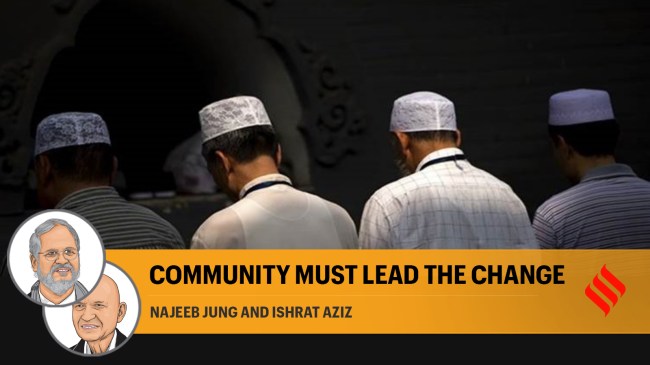Opinion In a challenging time, Indian Muslims must take the lead
They must look within while demanding justice from the state
 The road ahead is challenging but not insurmountable.
The road ahead is challenging but not insurmountable. The recent tragedy in Pahalgam has once again exposed the fragile fabric of Hindu-Muslim relations in India. Reports of violence targeting Muslims have surfaced from various parts of the country, adding to an already tense atmosphere. Sadly, this is not a new phenomenon; the climate of suspicion and hostility has been steadily building over the years, and has accelerated over the past decade. Against the backdrop of global Islamophobia, Indian Muslims today face some of the most difficult times in their history.
However, it is also important to acknowledge an uncomfortable truth: Over the past 75 years since Independence, Indian Muslims have not always taken proactive steps toward societal reform. Often influenced by conservative clergy, calls for modernisation and reform have been repeatedly resisted. Yet, the need for change is urgent. Reforms initiated from within the Muslim community itself, rather than those imposed externally, will have a far greater chance of acceptance and success.
It is crucial for Indian Muslims to embrace a secular outlook that aligns with the broader national interest. Strengthening secularism would not only enhance their own social standing but also contribute to India’s unity and progress. A clear path to self-reformation includes several critical steps:
Reforming Muslim personal law: The community must champion reforms ensuring equal status for women in matters of marriage, divorce, and inheritance. There must be much greater emphasis on women’s education, including higher education, and it must be ensured that they find a voice in society. Such measures are not alien to Islamic principles but resonate strongly with the Quranic emphasis on justice, equality, and human dignity. These principles, in fact, converge with the values enshrined in India’s Constitution, especially the Directive Principles that stress fraternity and equality.
Modernising waqf laws: Existing waqf regulations, rooted in an agrarian past, are ill-suited to today’s industrial and service-driven economy. Unlocking waqf assets and making them liquid would unleash significant resources for the welfare of the Muslim community and the nation at large. However, reform must be community-driven, not forced by governmental fiat, as has been the present effort. Any effort to force reform and changes in laws will be met with resistance and is likely to fail.
Rejecting job reservation: Instead of seeking reservation in employment, Muslims must demand constitutional guarantees — security of life, protection of property, and a fair, level playing field. Strength through merit, not political crutches, should be the guiding philosophy.
Embracing true secularism: Indian Muslims must insist on the complete separation of religion and state. The end of the Hajj subsidy was a positive step toward real secularism; similar government interventions in religious matters must be firmly rejected moving forward. However, it’s fair to say that this may apply to other faiths as well.
Understanding reform as fulfilment of faith: Reform should not be seen as a betrayal of Islam but as its true fulfilment. The Quran repeatedly emphasises welfare, progress, and societal well-being. Therefore, there must be greater debate among all sections of Muslims in an effort to think in the context of the times we live in and accept the need to adapt to modern society.
Committing to national advancement: Indian Muslims must strive to contribute meaningfully to India’s greatness through education, research, innovation, sports, and economic development. A vision of national progress must be deeply intertwined with community aspirations.
Advocating for national unity: It should be the mission of Indian Muslims to work tirelessly for the peace, unity, and integrity of India — from Kashmir to Kanyakumari, from Gujarat to the Northeast. As a community numbering over 200 million — equivalent to the population of Brazil, the fifth-largest country in the world in land mass — they have the power to shape a brighter, more harmonious future for India.
But self-reform cannot and must not be the domain of a select few. It requires a broad-based, democratic consultation involving clerics, scholars, social scientists, economists, retired civil servants, business leaders, NGOs, and other stakeholders. Only a multidisciplinary and inclusive approach can create sustainable, credible change.
At the same time, the government bears an equally vital responsibility. A level playing field must be ensured. Threats, violence, biased policing, and hateful rhetoric must cease. The Government of India must renew its commitment to secularism, uphold constitutional values, and initiate genuine dialogue with the Muslim community to rebuild trust. Without such measures, it is unreasonable to expect a beleaguered community to rally itself with confidence.
The road ahead is challenging but not insurmountable. Reform driven by Muslims themselves, supported by a fair and a just state, can lay the foundations for a stronger, united India. In fact, reforms initiated within India will not only leave a lasting impression on its neighbours as well but indeed be an example for other Islamic countries.
Jung is former vice-chancellor, Jamia Millia Islamia, former Lt Governor of Delhi, and currently, chairman, Advanced Study Institute of Asia. Aziz is former ambassador of India to Saudi Arabia, UAE, Brazil and Tunisia




